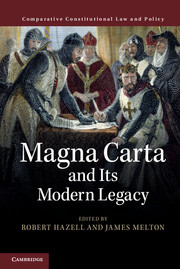Book contents
- Frontmatter
- Contents
- List of Contributors
- Preface
- INTRODUCTION
- PART I INFLUENCE IN THE UNITED KINGDOM
- 2 Magna Carta, the Rule of Law and the Reform of the Constitution
- 3 Eight Centuries On: Who Are Britain's Barons Now?
- 4 What Magna Carta Means to the Modern British Public
- PART 2 INFLUENCE AROUND THE WORLD
- PART 3 TWENTY-FIRST-CENTURY REFLECTIONS ON MAGNA CARTA
- Appendix English Translation of Magna Carta (1215)
- Bibliography
- Index
2 - Magna Carta, the Rule of Law and the Reform of the Constitution
from PART I - INFLUENCE IN THE UNITED KINGDOM
Published online by Cambridge University Press: 05 June 2015
- Frontmatter
- Contents
- List of Contributors
- Preface
- INTRODUCTION
- PART I INFLUENCE IN THE UNITED KINGDOM
- 2 Magna Carta, the Rule of Law and the Reform of the Constitution
- 3 Eight Centuries On: Who Are Britain's Barons Now?
- 4 What Magna Carta Means to the Modern British Public
- PART 2 INFLUENCE AROUND THE WORLD
- PART 3 TWENTY-FIRST-CENTURY REFLECTIONS ON MAGNA CARTA
- Appendix English Translation of Magna Carta (1215)
- Bibliography
- Index
Summary
I
On 13 July 2013, an article in The Economist referred to Magna Carta, in the context of the supposed Arab spring. It declared:
When you say that it takes decades not years, to bring about democratic change, you are off by a factor of 10. It takes centuries. The imperfect democracy we enjoy in the West has its roots in the Middle Ages. The signing of the Magna Carta in 1215 by the English King John can be held as a good starting point.
This is of course quite anachronistic. Magna Carta has all too often been interpreted not in terms of what it said, but of what interpreters believed or hoped that it said. Our understanding of it has evolved through time, not because we discover new evidence about it, but because our perspective alters. Our understanding of the past is, perhaps inevitably, influenced by our present standpoint. Historians, it has been suggested, remember the future and imagine the past.
Yet, although Magna Carta is by no stretch of the imagination a democratic document, it does contain one fundamental principle, which resonates throughout British history: the principle that government must be subject to law.
Of course, very little of Magna Carta survives today. Of its sixty-three clauses, just three remain. The rest have been repealed, and most have been superseded. The two most important clauses of the original document are 39 and 40:
(39) No free man shall be seized or imprisoned, or stripped of his rights or possessions or outlawed, or exiled, or deprived of his standing in any other way, nor will we proceed with force against him, or send others to do so, except by the lawful judgment of his equals or by the law of the land.
(40) To no one will we sell, to no one deny or delay right or justice.
In addition, the Charter insists that the king cannot arbitrarily tax his subjects without their consent.
- Type
- Chapter
- Information
- Magna Carta and its Modern Legacy , pp. 23 - 41Publisher: Cambridge University PressPrint publication year: 2015
- 2
- Cited by



